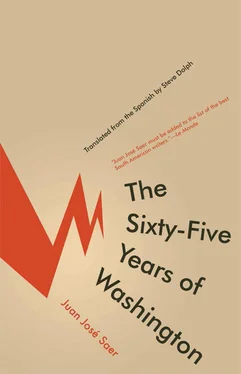Juan José Saer - The Sixty-Five Years of Washington
Здесь есть возможность читать онлайн «Juan José Saer - The Sixty-Five Years of Washington» весь текст электронной книги совершенно бесплатно (целиком полную версию без сокращений). В некоторых случаях можно слушать аудио, скачать через торрент в формате fb2 и присутствует краткое содержание. Год выпуска: 2010, Издательство: Open Letter, Жанр: Современная проза, на английском языке. Описание произведения, (предисловие) а так же отзывы посетителей доступны на портале библиотеки ЛибКат.
- Название:The Sixty-Five Years of Washington
- Автор:
- Издательство:Open Letter
- Жанр:
- Год:2010
- ISBN:нет данных
- Рейтинг книги:3 / 5. Голосов: 1
-
Избранное:Добавить в избранное
- Отзывы:
-
Ваша оценка:
- 60
- 1
- 2
- 3
- 4
- 5
The Sixty-Five Years of Washington: краткое содержание, описание и аннотация
Предлагаем к чтению аннотацию, описание, краткое содержание или предисловие (зависит от того, что написал сам автор книги «The Sixty-Five Years of Washington»). Если вы не нашли необходимую информацию о книге — напишите в комментариях, мы постараемся отыскать её.
The Sixty-Five Years of Washington — читать онлайн бесплатно полную книгу (весь текст) целиком
Ниже представлен текст книги, разбитый по страницам. Система сохранения места последней прочитанной страницы, позволяет с удобством читать онлайн бесплатно книгу «The Sixty-Five Years of Washington», без необходимости каждый раз заново искать на чём Вы остановились. Поставьте закладку, и сможете в любой момент перейти на страницу, на которой закончили чтение.
Интервал:
Закладка:
The Mathematician strikes a balance, as they say, between Botón’s virtues and defects, to the considerable annoyance of Leto, who has to correct the rather summary image he has been putting together. To Leto he was a pimple-faced, dark-skinned kid from Entre Ríos, a law student with more affection for wine and guitars than for the Civil code, a rape enthusiast in his free time, with a more or less conventional taste in books, and a somewhat obtuse intelligence, but now it turns out that he’s an exemplary young man, protector of the avant-garde, a kind of saint who’s capable of the greatest sacrifice (staying sober) if a higher end — this is the expression used in these cases — demands it. A doubt starts to take hold, as they say, of Leto, and he wonders if the Mathematician, in setting himself in radical opposition to Tomatis, has lost his critical faculty and is overstating the case, or worse still, Leto’s sensitive intuition tells him — though with nothing resembling words — or worse still, I was saying, if the Mathematician, having tasted the bitterness of human misery, life reduced to trying to keep a pair of pants from getting stained, only to rediscover, you could say, the ambrosia of life, the good in all things, sees virtues even in Botón. But these thoughts pass quickly, like silent sparks or dark flashes in the back of his mind, which is concentrating instead on the unforeseen lunge his body has to make, alongside the Mathematician’s, to step into the street, and a driver, seeing them, brakes slowly, and leaning toward them slightly to look at them through the windshield, makes a friendly gesture indicating that they can cross, which they do then and there, as they say, hurrying with an ostentation that, actually, doesn’t speed things up but instead lets them respond to the driver’s friendliness with their entire bodies, an ostentatious hurrying that more or less signifies, we’re hurrying as much as we can, so much that we don’t have the luxury of responding to your friendly gesture, but in fact our own friendliness consists in hurrying and which, ultimately, though it doesn’t speed things up very much since what has increased is their ostentation and not their velocity, still transfers them, like it or not, to the opposite sidewalk.
Curiously: Botón had actually, the previous Saturday, on the upper deck of the etc., etc., no? related to the Mathematician the arrival of Rita, Héctor, and Elisa at Washington’s birthday — at around 2:00 in the morning, apparently — Rita and Héctor already tipsy, to use Botón’s eloquent diminutive, and Elisa serious and detached as usual, acting like she was there involuntarily, declining to sit on the pretext that she was only there with Héctor and Rita, who were just stopping by to say hi. Of course they would be the last to leave — Rita because she can’t go to sleep before sunrise; Héctor because of the never-ending conversations he gets tangled up in with this or that person, about anything whatsoever; and Elisa standing near the grill at first then later near the door when the morning cold forced them inside, her purse pressed to her stomach, not drinking anything or talking to anyone, just to make it clear that she was being held there involuntarily by Héctor and Rita. He, the Mathematician, knows all of these details through Botón. Leto nods again, to show that he has understood, encouraging the Mathematician to continue: at that hour, 2:00 in the morning, things were going well — a short laugh escapes from the Mathematician, which Leto interprets as amusement at the recognition of the typical behavior of the group, most of whom the Mathematician knows well, and the recognition of the typical in each of them and the typical in the whole group produces a pleasant sense of familiarity with the world, and something like nostalgia, too — in Leto’s interpretation, at least — for the irrevocability of not having been there, of having been, on that same day and at that same hour, visiting factories in Frankfurt, victimized by humanity’s maladjustment — if the expression fits — to time and to space, as they call them, a two- or three-second laugh that, translated into words, might more or less say: How easily I can imagine them! How easily I can picture them now! How easily my senses can reconstruct that night without having captured it before! What sad luck to be in Frankfurt! What sad luck that the trip to Europe overlapped with Washington’s birthday! What sad luck that human beings, all living beings in general, prisoners of sequence, are forced to exist at a single physical point in space at a time, and that it’s impossible to abstract the successive transitions required to move from one point in space to another! the same way that Leto, who wasn’t there either, as we were saying, or rather yours truly, etc., etc., doesn’t stop thinking something or feeling something somewhere inside him, and not with anything resembling, etc., etc., which, converted into a verbal approximation, could more or less be the following: Two or three allusions from Tomatis imply that not inviting me was a premeditated decision, but they could also imply the opposite, if in fact they didn’t invite me because of some involuntary lapse, although on second thought the allusions were probably just a probe to find out why, given that they thought it unnecessary to invite me, I didn’t go, which would imply that they themselves were offended, but even allowing this possibility, that they consider me so close to Barco, the twins, and Tomatis that they didn’t need to invite me, any way you look at the thing, the facts force a submission to the evidence, they didn’t invite me.
And so on. In actuality — actually an expression, no? — Botón, on the deck of the ferry, almost from the moment he began, had started talking about that, about the arrival of Rita, Elisa, and Héctor, referencing the painters’ advanced stage of intoxication, as they say, because, having failed to catch the ten o’clock ferry due, it was obvious, to the all-night session he’d just ended, he was making what they call a subconscious effort to downplay his own behavior by exaggerating the others’. And, according to the Mathematician and always, and until further notice, according to Botón, the moment Héctor got wind of the earlier conversation — about Noca and Noca’s horse and Washington’s mosquitos — he started asking everyone there how it had been; what Noca had said about the horse and why; how credible his assertions were; how Cohen, Barco, and Beatriz had interpreted them and how they responded; and above all — and during this section of the interrogation Washington remained impassive and smiling as though he weren’t listening — and more than anything, the Mathematician said that Botón said, how exactly had Washington’s interjection happened and in what way was it connected to Noca’s horse, if it connected at all, and also wanting them — Héctor, no? — to tell it step by step, in complete detail, since he was starting to make sense of what had happened and could possibly clarify the murkier points of the problem somewhat, something which, given his state of tipsiness, as Botón would say, naturally inspired an intense skepticism among the gathering. To all of this Washington offered no response. Here the Mathematician felt obligated to clarify this impassivity for Leto, saying it’s a classic joke of Washington’s, consisting, when an explanation is demanded, of pretending not to have heard anything, a joke he only plays on those who are already familiar with it, in any case, since the opposite could come off as pride or hostility, two attitudes completely foreign to Washington, an innocent joke, besides, since those who are already familiar with it know well enough that he enjoys staying silent and smiling for a long time and that, moreover, the joke always precedes one of his interjections. Another of Washington’s classic jokes , the Mathematician annotates, satisfied that the joke conforms to his inclinations, consists of describing Omar Khayyam as the author of a treatise on cubic equations, pretending to not know that he also wrote the Rubaiyat . What’s clear is that Washington’s silence goes almost unnoticed amid the uproar and laughter that Héctor’s insistence generates. Let’s put you to bed, my love! Dib was shouting from the other end of the table while inserting a cigarette into the gold-plated mouthpiece that matched his gold-plated cigarette case, gold ring, and gold wristwatch, all glowing against his matte complexion, his rail-thin body topped off by a somewhat equine face divided into two mismatched halves — the top longer than the bottom — behind a large nose that supported gold-rimmed glasses above a black, well-trimmed beard.
Читать дальшеИнтервал:
Закладка:
Похожие книги на «The Sixty-Five Years of Washington»
Представляем Вашему вниманию похожие книги на «The Sixty-Five Years of Washington» списком для выбора. Мы отобрали схожую по названию и смыслу литературу в надежде предоставить читателям больше вариантов отыскать новые, интересные, ещё непрочитанные произведения.
Обсуждение, отзывы о книге «The Sixty-Five Years of Washington» и просто собственные мнения читателей. Оставьте ваши комментарии, напишите, что Вы думаете о произведении, его смысле или главных героях. Укажите что конкретно понравилось, а что нет, и почему Вы так считаете.












